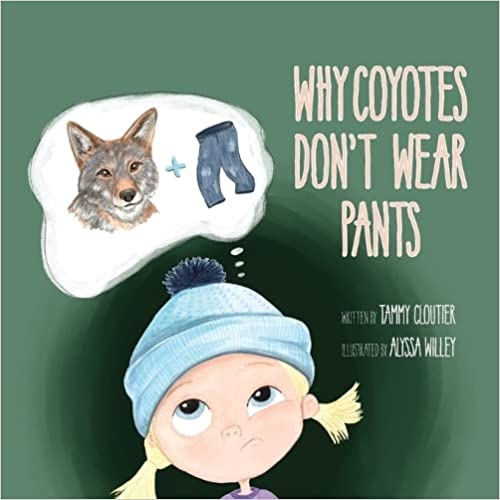 Tammy Cloutier is the Manager of Antioch University Writers’ Exchange and an Antioch Environmental Studies PhD Alum. She is also a passionate writer, with a specific affinity for animal behavior, wildlife conservation, and the intersections of art and science. Her PhD research focused on the effects of human disturbance on endangered African painted dogs, and she wrote and published a children’s book, Painted Dog Pursuit, during her PhD program to further support conservation, research, and to educate others about this species.
Tammy Cloutier is the Manager of Antioch University Writers’ Exchange and an Antioch Environmental Studies PhD Alum. She is also a passionate writer, with a specific affinity for animal behavior, wildlife conservation, and the intersections of art and science. Her PhD research focused on the effects of human disturbance on endangered African painted dogs, and she wrote and published a children’s book, Painted Dog Pursuit, during her PhD program to further support conservation, research, and to educate others about this species.
Tammy continues to combine her love of nature, conservation, and writing with the recent release of her second children’s book, Why Coyotes Don’t Wear Pants. Based in Maine, we connected with Tammy to learn more about the book and her process.
What was the inspiration for this book?
Humans have undeservedly villainized coyotes for decades. Rather than valuing their role in the ecosystems where they are present, they are persecuted by individuals, elected representatives, and wildlife agencies across the US. Here in Maine, coyotes can be hunted year-round (which includes a night hunting period as well), with no limits. Despite multiple attempts from Maine citizens to change these outdated policies, those that have the power to make a change continue to maintain the status quo. To take a break from interacting with adults, I decided to portray coyotes in a fun and different light to a younger audience. So in addition to sharing factual information in the book, I show silly similarities and differences between a young girl and coyote to highlight that coyotes are really not as scary and bad as some people make them out to be.
When did you first realize you wanted to be a writer?
I think it’s been hidden beneath the surface for most of my life :) I usually enjoyed the reading and writing assignments throughout school – particularly ones where I could use my imagination.
How long does it take you to write a book?
It varies. Some are outlined and fleshed out within a matter of weeks, others take months to develop.
What is your real-life work schedule like when writing?
While I would like to say I have a consistent schedule when it comes to devoting time to writing, I seem to write in spurts in between my other commitments. Sometimes I may write for a few days in a row, and sometimes I may not write for weeks.
Can you describe your writing space? Do you have a favorite place to write?
I scribble ideas on paper or text/email ideas to myself just about anywhere, but when it comes to the actual writing, I generally use my office so that I have my computer and large monitor in front of me. My office space is cozy with lots of natural light. I have birch trees and wildlife (bats, fox, wolf, seal, etc.) painted on my walls to make it feel like a little bit of the outside is inside with me : )
What would you say is your interesting writing quirk?
Not sure it’s interesting, or a quirk, but it seems like a good portion of my projects come to me while I’m walking in nature. Sometimes a book title will pop into my head and I’ll see what I can develop from that, and other times words, sentences, and storylines will manifest and then I have to try to capture them on paper before they disappear : )
What would you say is the most difficult part of writing a book?
My attention span. I have so many projects that are in different stages of development, and I’m constantly seeing new topics I want to explore!
Have you experienced writer’s block, and how do you handle it?
Not yet!
What was one of the most surprising things you learned in creating your books?
How long the process takes – and how much work goes into each stage – writing, illustrating, designing, publishing, etc.
What are your favorite books to read?
It used to be fiction, but now I love reading a variety of fiction and nonfiction books because there is always something else I want to learn.
Do you have any suggestions to help people become better writers? If so, what are they?
While writing can be a solitary endeavor, it’s super helpful – despite how scary it may be – to share your work with others for feedback at multiple points throughout the process (idea development, outlines, clarity, consistency, etc.). I didn’t learn the true value of this until my master’s and PhD programs. My master’s advisor, my Antioch cohort and faculty, my dissertation committee, Antioch’s Virtual Writing Center, and WEX all offered different valuable perspectives that I feel strengthened my writing in different ways.
 A third children’s book is in the works, and Tammy looks forward to future works of fiction and nonfiction while collaborating on projects with artists, scientists, and more. Learn more through her website tammycloutier.com.
A third children’s book is in the works, and Tammy looks forward to future works of fiction and nonfiction while collaborating on projects with artists, scientists, and more. Learn more through her website tammycloutier.com.
As a writer, editor, and lifelong learner who has always enjoyed writing, her past experiences include drafting reports for environmental organizations, local newspapers, and publishing her own children’s books. In addition to offering writing assistance to peers, she served as an adjunct instructor for Natural Science and Veterinary Technology courses at a local community college and obtained degrees in Wildlife Science from Texas A&M and Psychobiology from the University of New England, as well as her PhD in Environmental Science from Antioch University New England.
